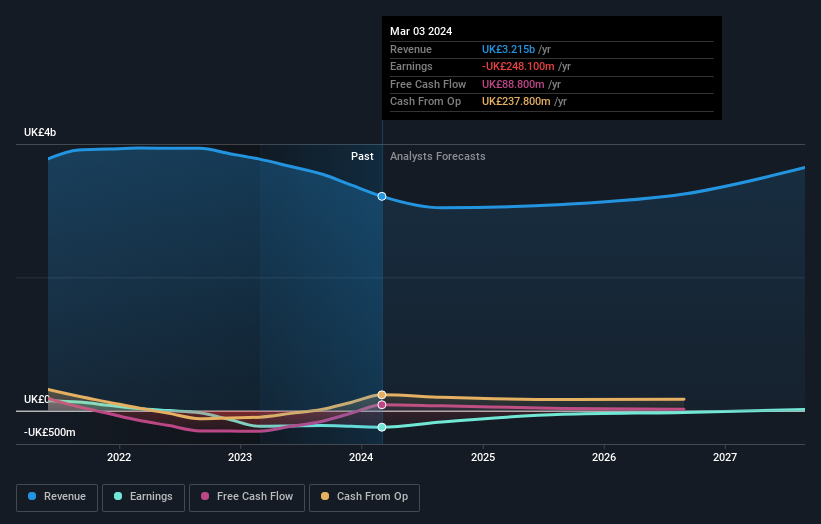- United Kingdom
- /
- Specialty Stores
- /
- LSE:ASC
Shareholders in ASOS (LON:ASC) have lost 89%, as stock drops 10% this past week

Long term investing works well, but it doesn't always work for each individual stock. We don't wish catastrophic capital loss on anyone. Spare a thought for those who held ASOS Plc (LON:ASC) for five whole years - as the share price tanked 89%. Even worse, it's down 14% in about a month, which isn't fun at all. We really hope anyone holding through that price crash has a diversified portfolio. Even when you lose money, you don't have to lose the lesson.
Since ASOS has shed UK£49m from its value in the past 7 days, let's see if the longer term decline has been driven by the business' economics.
Check out our latest analysis for ASOS
Because ASOS made a loss in the last twelve months, we think the market is probably more focussed on revenue and revenue growth, at least for now. When a company doesn't make profits, we'd generally hope to see good revenue growth. As you can imagine, fast revenue growth, when maintained, often leads to fast profit growth.
Over five years, ASOS grew its revenue at 5.7% per year. That's not a very high growth rate considering it doesn't make profits. It's not so sure that share price crash of 14% per year is completely deserved, but the market is doubtless disappointed. We'd be pretty cautious about this one, although the sell-off may be too severe. A company like this generally needs to produce profits before it can find favour with new investors.
You can see how earnings and revenue have changed over time in the image below (click on the chart to see the exact values).

ASOS is well known by investors, and plenty of clever analysts have tried to predict the future profit levels. If you are thinking of buying or selling ASOS stock, you should check out this free report showing analyst consensus estimates for future profits.
A Different Perspective
While the broader market gained around 15% in the last year, ASOS shareholders lost 6.1%. Even the share prices of good stocks drop sometimes, but we want to see improvements in the fundamental metrics of a business, before getting too interested. However, the loss over the last year isn't as bad as the 14% per annum loss investors have suffered over the last half decade. We'd need to see some sustained improvements in the key metrics before we could muster much enthusiasm. I find it very interesting to look at share price over the long term as a proxy for business performance. But to truly gain insight, we need to consider other information, too. Take risks, for example - ASOS has 1 warning sign we think you should be aware of.
For those who like to find winning investments this free list of undervalued companies with recent insider purchasing, could be just the ticket.
Please note, the market returns quoted in this article reflect the market weighted average returns of stocks that currently trade on British exchanges.
New: Manage All Your Stock Portfolios in One Place
We've created the ultimate portfolio companion for stock investors, and it's free.
• Connect an unlimited number of Portfolios and see your total in one currency
• Be alerted to new Warning Signs or Risks via email or mobile
• Track the Fair Value of your stocks
Have feedback on this article? Concerned about the content? Get in touch with us directly. Alternatively, email editorial-team (at) simplywallst.com.
This article by Simply Wall St is general in nature. We provide commentary based on historical data and analyst forecasts only using an unbiased methodology and our articles are not intended to be financial advice. It does not constitute a recommendation to buy or sell any stock, and does not take account of your objectives, or your financial situation. We aim to bring you long-term focused analysis driven by fundamental data. Note that our analysis may not factor in the latest price-sensitive company announcements or qualitative material. Simply Wall St has no position in any stocks mentioned.
About LSE:ASC
ASOS
Operates as an online fashion retailer in the United Kingdom, the European Union, the United States, and internationally.
Fair value with mediocre balance sheet.
Similar Companies
Market Insights
Community Narratives


